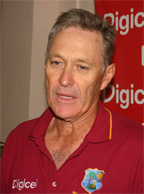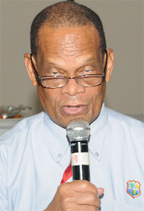Cozier on Sunday
LESS than a week ago, the troubled face of West Indies cricket, for so long wreathed in the wrinkles of on-field mediocrity, administrative ineptitude and uncompromising player power, at last wore the smile of success and optimism.

Against most expectations and by dint of new fighting qualities, the Wisden Trophy had been recaptured after nine, agonising years in England’s possession.
Five days later, the jubilation was further boosted by the spirited, emphatic victory over England in the first 20/20 International at a Queen’s Park Oval filled to near pulsating capacity for the first time in ages.
The shame of the sandpit at the Sir Vivian Richards Stadium in Antigua that caused the abandonment of second Test after 10 balls and other indignities of the recent past were all but forgotten.

As the team arrived in Guyana last Monday for the first two in the series of five ODIs, they were greeted as heroes, not as the nondescripts in the period when one defeat followed another and public disenchantment grew.
There were placards of praise and cheering schoolchildren along the route to hail them.
The acclaim was, more especially and understandably, for the phenomenal Shivnarine Chanderpaul, Guyana’s most celebrated sportsman, the ICC’s Cricketer of the Year and, as the government announced, soon to receive the Cacique Medal of Honour, the nation’s third highest award.
The euphoria inevitably touched the team.

“Even on our bus route to the ground in Trinidad (for the final Test and the 20/20), there were people standing along the streets cheering and waving,” head coach John Dyson, the Australian less than a year and a half in the post, observed. “That gave the boys a lift. I think it just goes to show that there is still a great passion for the game here and, if we can build on this result, it can only lift the spirit and the game around the region.”
The vibes were such that, when they finally made it through the stringent, infuriating security, close to 18,000 fans flocked into the National Stadium at Providence for Friday’s first ODI. Equipped with their flags, their signs and their XM and El Dorado they came in the full expectation of another triumph for their revitalised team.
By the end of the day, their mood exiting the stadium was one of anger and frustration. Their hopes had been summarily dashed by happenings off the field.
Most were readily identifiable from disconcerting past, repeated experience of conflicts between the West Indies Cricket Board (WICB) and the West Indies Players Association (WIPA).
One added a new entry to the long list of blunders contributing to the prolonged decline of West Indies cricket. It was the conceding of a close, exciting match to England through coach Dyson’s careless misreading of the Duckworth/Lewis schedule in his desire to win by any available method. The wave to him as the team bus drives past in future is likely to be with two fingers.
Well before then, Dinanath Ramnarine, the WIPA’s president and chief executive, had chosen this rare and welcome moment of success to strike, both literally and figuratively, on the players’ behalf against the continuing incompetence of the West Indies Cricket Board (WICB).
It was the same in 2004, two months after the West Indies’ victory in the Champions Trophy final over England in London, when both the WICB and the WIPA, already with a history of mutual mistrust, dug in their heels over a disagreement on sponsorship contracts.
It led to the selection of a second string team for a tour of Sri Lanka the following year and divisions among players that are only now being healed.
There was, eventually, a settlement but it has always been tenuous. Seeking further rapprochement, one of Julian Hunte’s first decisions on election as WICB president in 2007 was to appoint Ramnarine a non-member director.
“The WIPA has now been given the opportunity to be part of the solution instead of continuing to be perceived as part of the problem,” he said at the time. “It is both a challenge and an opportunity for that organisation.”
It was a forlorn hope. The combination was never compatible. On the eve of Friday’s ODI, Ramnarine announced his resignation, at the same time listing a dozen “critical issues” with the WIPA that remained unresolved.
“While my organization was prepared to give some time for action to be taken, that time has expired,” he added.
Given the WICB’s record of ineffectiveness, Ramnarine’s claims could not be doubted.
That such subjects as retainer contracts and players’ fees for the recent tour of New Zealand, for the current England series and for the first-class season are still unresolved only confirms his position.
What can be questioned are Ramnarine’s timing and his methods.
The WICB has this year lost sponsors of both its major regional tournaments, KFC and Carib Beer. It has to run them at a considerable loss, especially with the extended first-class series this season. As it turns out, Stanford’s millions were never what they seemed and are now gone forever.
That leaves Digicel as the one major financial supporter of West Indies cricket. So what was the players’ response?
Although they stated they have no grouse with Digicel, they – including Chris Gayle, Ramnaresh Sarwan and Denesh Ramdin who have individual contracts with the company – boycotted an official Digicel function in Georgetown on Wednesday night.
They then placed silver duct tape over the Digicel name on the right of their shirt sleeves during the first half of Friday’s match (before, bizarrely, changing it to the other nameless sleeve for the remainder).
If the point was to embarrass a WICB that is beyond embarrassment, they could not imagine Digicel to regard it any other way but disrespect.
Sponsorship is critical to the well-being of all sport and all professional sportsmen. Given the present economic downturn and the WICB’s record of dysfunction, it is increasingly difficult to source.
Such misdirected protests are unlikely to prompt Digicel, or anyone else, to continue pumping their money into West Indies cricket and, by extention, West Indies cricketers.
Nor will any company be inclined to take up the can from Carib for the first-class tournament after the WIPA’s decision to call a strike for the first day of the latest round of matches.
Carib experienced the same scenario in the semi-finals in its first years as sponsors in 2003. Nothing has changed in the interim and the object of the WIPA exercise was to press for increased fees from the present pitiful US$250-US$400 a match. Seeing that there is no sponsor, it is difficult to know where the money is to come from.
The upshot of all this is that WICB president Hunte and other directors are to meet in Barbados on Tuesday with representatives of the WIPA and the West Indies team (it would be better for there to be as many as can be present and not just the elite from the international team).
Ramnarine, no doubt, will assert that it needed his strong action to get the WICB to budge. The meeting might achieve its short-term objective, as others have done in the past before the next inevitable dispute arises, but more unnecessary long-term damage has again been done.
